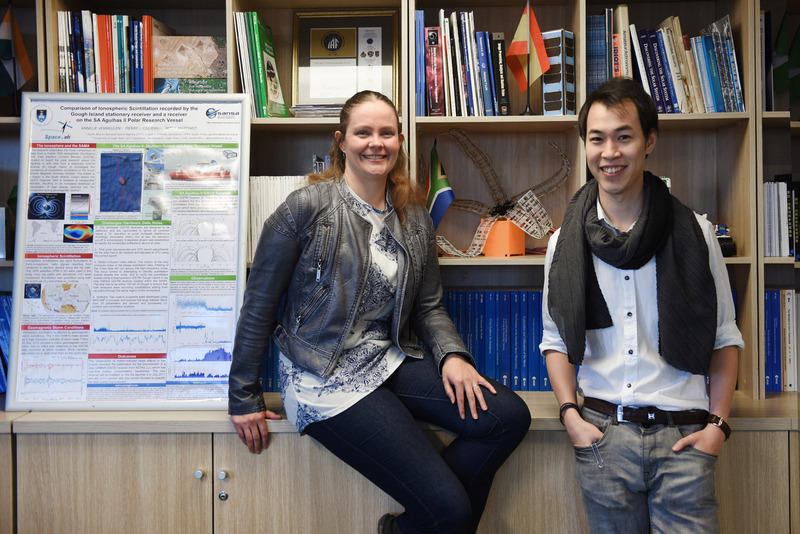To infinity and beyond
27 July 2017 | Story Kate-Lyn Moore. Photo Robyn Walker.
The sky isn’t the limit for two master’s students from UCT’s SpaceLab who have been selected for the International Astronautical Federation’s (IAF) 2017 Emerging Space Leaders (ESL) Grant Programme.
Ani Vermeulen and Louis Feng, who are both working toward their MPhil in space studies at UCT, are among the 14 candidates selected from around the world who are being groomed as future space industry leaders.
The grant programme enables students and young professionals, who would otherwise be unable to attend, to participate in the annual International Astronautical Congress (IAC) – the world’s largest global space industry conference. This year’s congress takes place in September in Adelaide, Australia.
“I think it’s a big responsibility, to have an international body like the IAF put their faith in you,” says Vermeulen.
“I also feel like I am representing not only SpaceLab and UCT, but also South Africa, which is why I am determined to live up to the responsibility. I want to learn as much as possible from the experience so that I can become the leader they think I can be.”
Both Vermeulen and Feng will be presenting at the conference, where they will be rubbing shoulders with the best and the brightest in their industry. Attended by the leaders of the world space agencies, and including presentations on technical breakthroughs and discussion panels on the latest trends in space research, the multidisciplinary event is essential for those pursuing a career in the space scene.
Dreaming of space
Vermeulen began her career in telecoms, Feng in petroleum technology. While each excelled, in their hearts they longed for something else.
They both found what they were looking for in UCT’s Space Studies programme, SpaceLab, which is the only one of its kind in Africa.
“The space studies programme has truly been an amazing experience, where I get the opportunity to interact with space experts around the world, who were kind enough to share valuable knowledge with us. That knowledge includes space law, space application and space engineering,” Feng says.
This stood the pair in good stead when it came to applying for the ESL Grant Programme. With only 14 places up for grabs, the competition was tough.
“I’m so impressed by the other grant recipients that I still have moments of disbelief when I see my name up among theirs,” says Vermeulen.
In the run-up to the IAC they will attend the Space Generation Congress (SGC), the UN/IAF Workshop, a young professionals’ workshop, the cross-cultural and presentation workshop and the IAF International Student Workshop.
It will be an intensive 10-day cluster of events, culminating in their presentations at the IAC itself.
Feng is due to present on the debris-capturing mechanism prototype he developed, called MEDUSA (Mechanism for Entrapment of Debris Using Shape-memory Alloys). In simple terms, MEDUSA cleans up space junk.
Feng will speak to the technical aspects of this project, including the results from the vacuum-chamber tests he completed at the Institute for Space Systems at Stuttgart University, Germany.
It is through reducing space debris that Feng hopes to preserve the long-term sustainable use of outer space. We should care about space junk, he asserts, and we need to be aware of the potential threats should we not treat it properly.
Vermeulen will present on her research in satellite navigation applications, specifically on using GPS signals to study the ionosphere. Her newfound passion, however, is in Space Mission Analysis and Design (SMAD) and she hopes to make a career out of it.
“There are so many questions to answer, so many system design choices to manage that all affect each other. You have to understand both the big picture and the tiny details, and how they affect each other. It’s amazing and difficult and exciting and complex and just the best job on the face of the Earth, because at the end of the day that’s where you’re trying to get away from,” she says.
 This work is licensed under a Creative Commons Attribution-NoDerivatives 4.0 International License.
This work is licensed under a Creative Commons Attribution-NoDerivatives 4.0 International License.
Please view the republishing articles page for more information.










